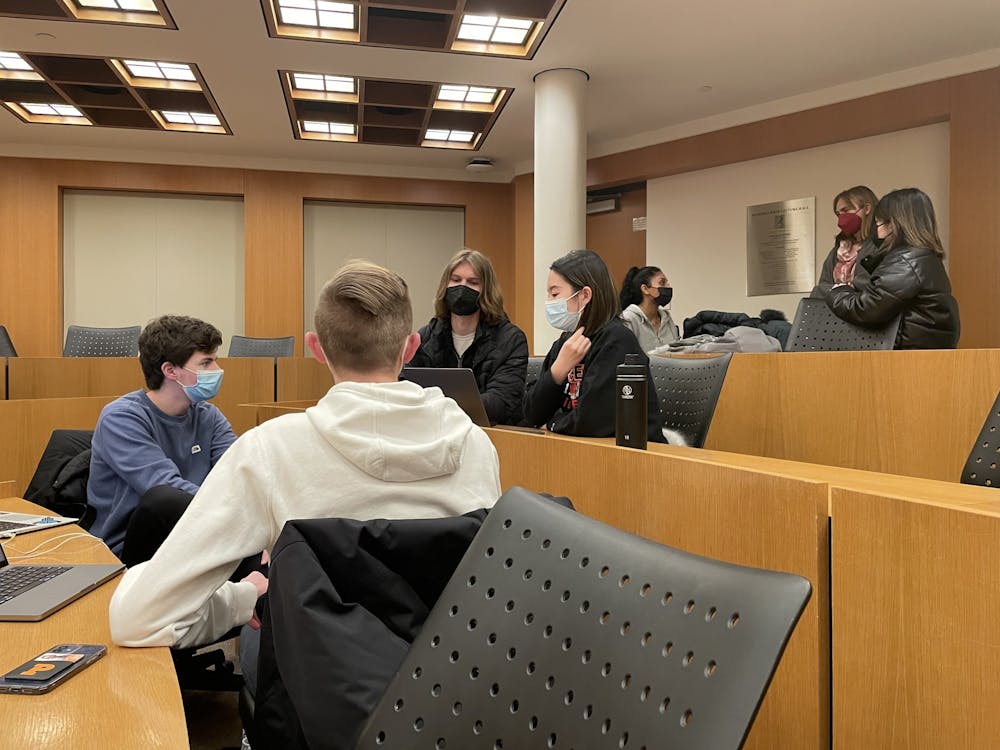On Sunday, Feb. 20, the Undergraduate Student Government (USG) discussed ideas for improving mental health on campus, approved a new student group — Princeton Blockchain Society — and allocated funding for a Muslim Student Association (MSA) event.
Ahead of this week’s meeting, USG President Mayu Takeuchi ’23 asked every senate member to brainstorm mental health-related initiatives that fit within their specific committees and task forces.
This request by Takeuchi was borne out of a campaign promise of hers. As a candidate, she promised an increased commitment to focusing on mental health throughout all areas of USG.
“Mental health is more than CPS [Counseling and Psychological Services]. We want to take a holistic approach that builds in all of our different roles and we want to promote them all together,” Takeuchi said.
USG representatives got into groups to share ideas, which included using the USG platform to increase student engagement in non-academic activities, implementing recommendations from last semester’s health survey, expanding CPS, and working towards better communication between various resources like CPS, University Health Services (UHS), Directors of Student Life (DSLs) and Residential College Advisers (RCAs).
Undergraduate Student Life Committee (USLC) Chair Avi Attar ’25 spoke about “reframing [USG’s] approach in terms of being more proactive and less reactive.”
Campus and Community Affairs (CCA) Chair Isabella Shutt ’24 suggested advocating for a role within residential colleges to “facilitate community and mental wellbeing” that is separate from DSLs, who serve as a resource for students but are also responsible for disciplinary action.
“This should not fall entirely on RCAs or DSLs,” Shutt said, emphasizing the importance of supporting staff in their work to care for students’ mental health on campus.

Noah Luch ’24 of Princeton’s Mental Health Initiative (MHI) proposed that USG “establish a centralized safe space on campus” separate from academic and dorm spaces, where students can destress.
In a similar vein, Luch pointed out the importance of not just mitigating mental health issues, but also “eliminating the sources” of imposter syndrome and other issues affecting student mental health.
U-Councilor Carlisle Imperial ’25 weighed in on the distinction between instances of mental health issues and the academic challenges associated with college.
“Definitely, there are some aspects of college that are unnecessary, that cause us undue stress and potentially aggravate anxiety,” he said.

“But at the same time, we are in college and we're at an extremely difficult institution, we have to remember that. So I'm very hesitant to advocate for something that will make our learning experience, our growth experience easier,“ he continued. “But I will 100 percent back something that will facilitate a culture surrounding mental health where we feel comfortable saying, you know, this school is hard.”
Academics Chair Austin Davis ’23 also spoke on the importance of having “honest conversations” about student experiences.
Referencing the Princeton Perspective Project, a USG and ODUS-affiliated initiative that aims to strengthen student resilience and realistic expectations, Davis said, “what is going on with [it] right now, it would be really interesting to see how we can have more conversations about how there’s no such thing as a perfect Princeton student.”
Lehman Montgomery ’22 of the Student Groups Recognition Committee (SGRC) presented a new student organization, Princeton Blockchain Society, for approval from the Senate.
Montgomery indicated that SGRC was initially worried that approving the group “would be duplicative with the Blockchain at Princeton club.” However, he went on to explain that SGRC realized there is a significant enough distinction between the two to warrant separate groups.
“Blockchain at Princeton is more so a [startup] incubator aligned with the Entrepreneurship Club [while] Princeton Blockchain Society is more focused on education and research,” Montgomery said.
All voting members voted to approve the formation of the new club.
The Senate also voted unanimously to approve a funding request for MSA to host a spring formal. $1,500 of the $2,000 request will be provided by the USG Projects Board, with the remainder of the funding to come from the Office of the Dean of Undergraduate Students.
“It’s an important time for us to actually gather as a community,” said MSA representative Muskan Effendi ’24.
The meeting concluded with a presentation from Imperial and Ned Dockery ’25 on the topic of survey techniques and data collection. The pair gathered ideas on how to best elicit student feedback and minimize response bias in surveys.
USG Senate meetings are held in Robertson Hall Room 016 at 8 p.m. on Sunday evenings and are open to all.
Annie Rupertus is a first-year from Philadelphia and a News Staff Writer who covers USG for the ‘Prince.’ She is also a designer for the print issue. She can be reached at arupertus@princeton.edu or @annierupertus on Instagram and Twitter.








